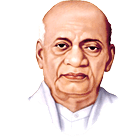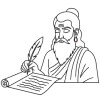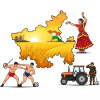Introduction to the Festival:
Karva Chauth is one of the major Hindu fasts, especially observed by married women in northern India. It falls on the Krishna Chaturthi (fourth day) of the Kartika month. On this day, women fast from sunrise to moonrise without consuming food or water, praying for the long life, health, and prosperity of their husbands. The festival symbolizes love, trust, and dedication in married life.
The Story Behind Karva Chauth:
The most popular story behind Karva Chauth is of a devoted wife named Karva. One day, while her husband was bathing in a river, a crocodile caught hold of him. Karva, with her true love and penance, called upon Yama, the god of death, and prayed for the crocodile to be sent to hell. Impressed by her determination and devotion, Yama sent the crocodile to hell and granted her husband life again.
Another famous story is from the Mahabharata. When Arjuna went to the Nilgiri mountains to perform penance, Draupadi shared her concerns with Lord Krishna. Krishna, understanding her worry, explained the significance of Karva Chauth and advised her to observe the fast. Draupadi observed Karva Chauth, and as a result, Arjuna was protected.
Why We Celebrate This Festival:
Karva Chauth is observed for the long life, good health, and prosperous life of one's husband. It is not only a religious ritual but also a festival that strengthens the bond of love, trust, and devotion in a married relationship. This is a special occasion for women to fast for the well-being of their family and spouse.
Key Traditions of Karva Chauth:
Married women eat a special pre-dawn meal known as Sargi (provided by their mother-in-law) before beginning their fast.
Throughout the day, preparations for the evening puja are made.
In the evening, women perform the puja by placing water, wheat, sweets, and other items in a Karva (a clay pot).
They worship Karva Mata and Lord Shiva's family.
After sighting the moon, women look at their husbands through a sieve (Chalni) and break their fast.
The husband offers water to the wife to break the fast.
Significance of the Festival:
The religious and cultural significance of Karva Chauth is profound. It is a symbol of female strength, penance, devotion, and love. The fast represents a woman's sacrifice, love, and dedication. It not only strengthens marital life but also brings positive energy and unity within the family.








